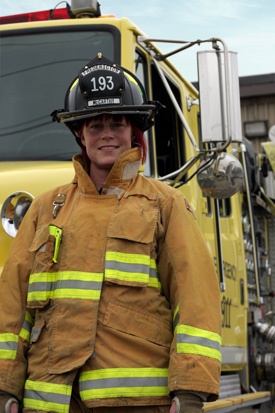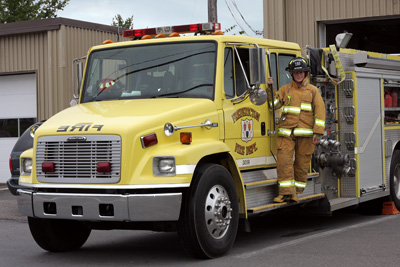 |
Nina McCarthy, who works as a Fire Inspector with the City of Fredericton, hadn't even considered a career in firefighting even though she grew up with it around her.
“My father was the fire chief at CFB Gagetown, my grandfather was a Saint John city firefighter and two of my uncles are career firefighters,” says McCarthy.
In July 2000, while volunteering at the IWK Telethon in Fredericton, she was approached by Fredericton Fire Captain, Ken Pike, and ended up talking about careers and firefighting. “All those years and all that exposure I hadn't even thought of going into firefighting until then,” says McCarthy who was instantly inspired. “I went home and talked with my dad about it and he was 100% supportive.” |
She landed her first job as a firefighter later that same year. Back then, when McCarthy had applied, potential candidates had to apply to the posting, and then write an aptitude test, complete a physical test and a work-related test. From there, candidates were ranked, and based on hiring needs they were hired from the ranks.
Nowadays, aspiring firefighters need to attend a fire academy. There are three currently located in the Atlantic Provinces (Nova Scotia, Prince Edward Island and Newfoundland and Labrador). Much like the police academy – candidates must complete the training there and do a few months of on-the-job training through the academy at a fire department. Upon completion, graduates receive a certificate in firefighting.
“It was one of those things that happened really quickly,” says McCarthy who left university to pursue the opportunity. McCarthy added that she was still able to complete her Arts degree in criminology part-time, graduating in 2007.
“I just never thought about that path before probably because there were no other female firefighters at the time,” says McCarthy. Fredericton's first female firefighter, Shelley Ryan, was hired only a couple months before McCarthy's conversation with Captain Ken Pike. “When I was starting out, Shelley was the only one in the province,” says McCarthy.
Currently, Fredericton employs eight female firefighters and Saint John employs three female firefighters.
Today, McCarthy's firefighting career has spanned 10 years, having worked as a firefighter for almost 6 years and a fire inspector for the past 4 years.
“As a firefighter your days tend to be fairly exciting and you certainly can't plan for them,” says McCarthy. “A typical day could be anything from freeing someone from a car with the Jaws of Life to putting out a fire in an apartment to rescuing someone who's flipped their boat to delivering a baby.”
Firefighters in Fredericton work shifts that are four day rotations, working two 10 hour days then two 14 hour nights followed by four days off. During their shift, firefighters live at the fire station. “Your crew is your family and like any family, there are some days where you'll have disagreements but at the end of the day, you all care for each other,” says McCarthy.
“During the daytime, you're always working – whether you're on a call, cleaning the station ( because it's your house ), or training,” says McCarthy. “The day passes by fast because we're always kept busy.”
“During weather extremes like when it's plus 30 degrees Celsius outside – fire gear can be incredibly heavy and hot so it can be physically challenging,” says McCarthy noting that the weather extremes are the times when firefighting can be really draining.
“As a fire inspector, your days are a little easier to predict because you can book appointments to do inspections, to give lectures, to provide training, but the one thing you can't predict are fires and inspectors conduct the fire investigations,” says McCarthy of her current position. “The real benefit is that it's a Monday to Friday work schedule so you get a normal work schedule.”

When asked what she enjoyed more – firefighting or fire inspection? McCarthy quickly responds “I definitely enjoy firefighting!”
“What I love most about working for the fire department are the people that I work with,” says McCarthy.
“The people who get into firefighting are a special breed of people, they all want to help others,” says McCarthy adding that's the whole reason you get into this job and these types of people are great to work with.
“The work environment is very different from others – it really is like a family,” says McCarthy. “You really look out for each other. It's a pretty special place to work.”
McCarthy notes that the biggest challenge as a fire inspector is time management. “Right now we have an incredible workload and are trying to fit everything in,” says McCarthy. “It's a juggling act.”
“I think for those on the truck, their biggest challenge is to not take their work home with them,” says McCarthy. “We see a lot of things in our job and sometimes it's hard to not carry it with you.”
“It's very common that if we've had a rough call to come back to the station and to talk it out with each other.”
When asked if she has faced any challenges from working in a traditionally male dominated profession, McCarthy laughs, noting that bathrooms (or lack thereof) can make it difficult when you're on site for a fire. “When you're out of the station for 10 hours and more, those are challenges you wouldn't think of,” says McCarthy. “Other than that, we're a unionized workplace so everything is on even ground for most things.”
McCarthy has observed more women pursuing this career path. “Four summers ago, we hired five women in one year,” says McCarthy who often gets to speak at high schools and middle schools about careers in firefighting.
“I stay in this profession because I'm happy coming to work,” says McCarthy adding that the majority of people who enter this profession work really hard to get into it.
“It's a very rewarding career,” says McCarthy. “Not many people get to go home and say I saved someone today. Very few ever leave the profession. Most stay in it for life.”
“This career isn't for the faint of heart, there are difficult days,” says McCarthy. “It's a very challenging career, and the challenges can be both psychological and physical and you have to be prepared for that.”
McCarthy explains that there's a range of issues new firefighters need to be prepared for, because you deal with not just the fires or accidents but you are also with people who've lost property or loved ones.
McCarthy's advice for future firefighters?
“Go for it. It's the best job in the world, but be willing to go elsewhere for work,” says McCarthy. “There are not a whole lot of jobs around here; so as long as you're willing to take a position anywhere it's offered, you will do fine. It's a very rewarding career.”
For more information, visit:
|
